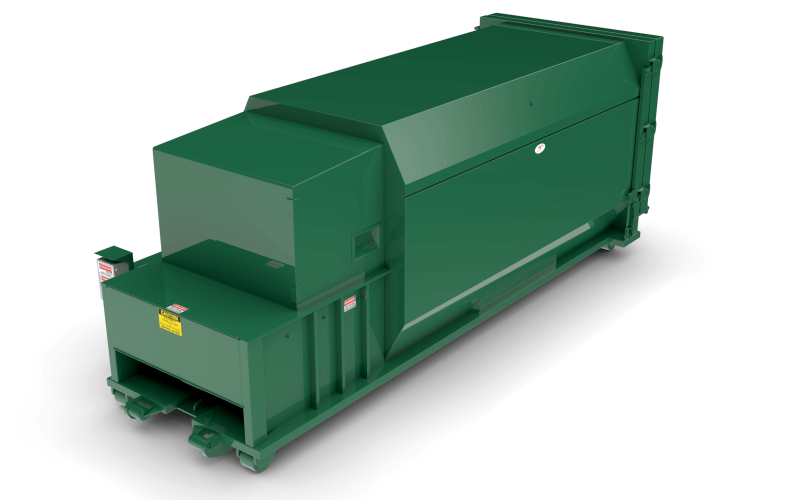CALL NOW FOR A FREE QUOTE 866.760.8194
Renting vs Financing a Commercial Compactor
When considering using a commercial compactor for waste management in your business, one important decision to make is whether to rent or finance the equipment. Renting a compactor allows flexibility and lower upfront costs, while financing provides ownership and potential tax benefits. Taking the time to explore the advantages and disadvantages of renting versus financing a commercial compactor helps you make an informed decision that meets your needs and budget.
Why You Need a Commercial Compactor
If you own a business, such as a quick-serve restaurant, you know you produce a lot of waste. Garbage, recycling, and hauling fees likely take up a large percentage of your monthly budget. Rather than throw away money, consider the benefits of a commercial compactor. A commercial waste compactor can help reduce your waste costs in several ways, including:
- Increased efficiency: Compacting your waste takes up far less space. This can greatly reduce your waste costs, as haulers typically charge based on weight and/or capacity.
- Less frequent waste pickups: The less a hauler has to come and remove your trash, the more money you will save.
- Improved sanitation: By minimizing and compacting waste, you can increase the cleanliness around your dumpsters and better contain the unsavory side effects of accumulated waste, such as smell.
These are just a few of the benefits of using a commercial compactor. If you have decided that this would work for your business, you may be wondering if it is better for you to rent or purchase one. Below, the experts at Global Trash Solutions (GTS) have laid out the pros and cons of renting or financing a commercial compactor to help you make the best decision for your business.
Renting a Commercial Compactor: Pros and Cons

Renting a commercial compactor offers several advantages and disadvantages that should be considered before making a decision.
Pros:
- Lower upfront costs: Renting a compactor requires less initial upfront investment compared to purchasing one outright.
- Flexibility: Renting allows you to upgrade or downgrade equipment based on changing needs without being tied down to ownership.
- Maintenance included: Many rental agreements often include maintenance and repair services, reducing additional costs and hassle.
- A great option for new businesses: New businesses may not have the established credit to get approved for financing, so renting is perfect.
- You do not own the property: If you rent or lease the property where your business is located, renting a compactor may be more appropriate in case you move.
Cons:
- Long-term costs: While choosing a compactor for rent may be cheaper initially, long-term rental fees can add up over time and potentially exceed the cost of purchasing.
- Limited features/customization options: Rented compactors may offer fewer features and customization options than purchased units, limiting their functionality for specific needs.
- No equity or ownership: Renting means you do not build equity in the equipment, and you must return it once the rental agreement ends.
Overall, renting a commercial compactor can be a cost-effective solution for businesses with fluctuating waste management needs or a limited capital budget but may not provide the same level of control or value as owning your equipment.
Financing a Commercial Compactor: Pros and Cons

Financing a commercial waste compactor offers several benefits and drawbacks you need to consider when deciding between renting and financing.
Pros:
- Ownership: Financing allows you to own the equipment outright once your loan is paid off, providing long-term value and potential resale opportunities.
- Customization options: Purchasing through financing provides more flexibility in choosing features and customization options tailored to your specific waste management needs.
- Tax benefits: Financing a commercial compactor may provide tax deductions or credits for equipment depreciation or interest payments.
Cons:
- Higher upfront costs: Financing typically requires a larger initial investment than renting, as it involves an upfront down payment and regular monthly loan payments. Waste compactor prices can range from around $12,000 upward to $85,000, and you could need 20 percent or more down.
- Maintenance costs: As an owner, you are responsible for maintaining and repairing the equipment, which can lead to additional expenses over time.
- Depreciation: Similar to any other equipment purchase, the value of a commercial compactor depreciates over time, potentially affecting its resale value.
While financing a commercial waste compactor may involve higher upfront costs and responsibilities than renting, it offers long-term ownership benefits.
Is Renting or Financing Best for You?
Whether to rent or finance a commercial compactor depends on your specific business needs, budget, and long-term goals.
Renting may be best for you if:
- You have limited upfront capital and prefer lower initial costs.
- Your waste management needs are fluctuating or temporary.
- Flexibility is important, allowing you to upgrade or downgrade equipment as needed easily.
- Maintenance and repair services included in the rental agreement are beneficial for your operations.
Financing may be best for you if:
- Long-term cost savings through ownership and potential resale value are important to your business.
- Features and customization options tailored to your specific waste management requirements are necessary.
- You want the tax benefits of ownership, such as depreciation allowances, to offset the initial investment costs.
- You plan on using the commercial compactor as part of your business operations long term.
Where Can I Rent or Finance a Commercial Compactor?

You can rent or finance a commercial compactor for your business through Global Trash Solutions. Simply complete our online application form to rent or finance a compactor. If you choose to finance your compactor, we also offer extended warranties and maintenance coverage options to help protect your investment.
We recommend starting with a free waste audit and analysis by our experienced waste management professionals. This will help determine which type of compactor is best for your business. We also have the best selection of commercial compactors for every need and every type of business. Contact us today to request your free waste audit and assistance in renting or financing a commercial compactor.
Recent Post
Is Hiring a Waste Consultant Right for Your Business?
Managing waste and recycling needs poses a distinct hurdle for businesses focused on…
Read More >Understanding Scope 3 Emissions
Scope 3 emissions are an important component of a company’s total greenhouse gas…
Read More >